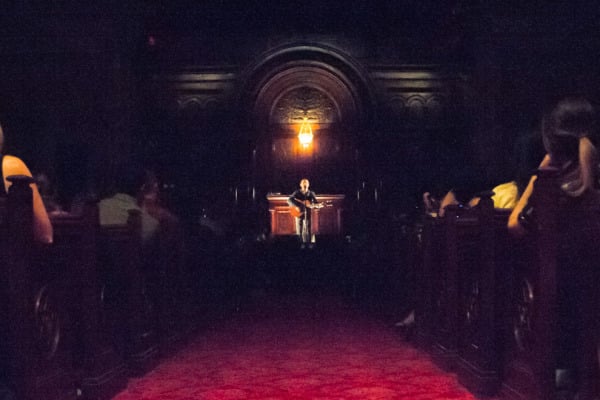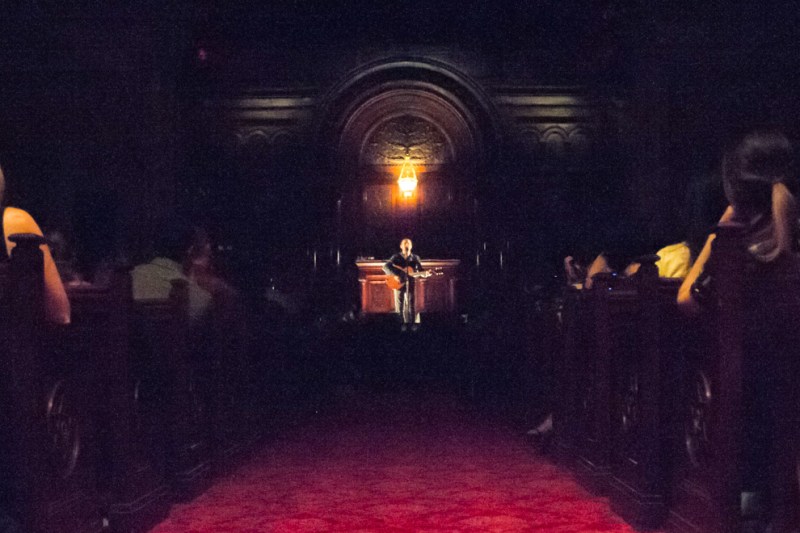
One mishap had led to the next—first, a delayed Caltrain; then, an inexperienced Lyft driver—but we were here. Irene and I raced up the stairs, bypassed the refreshments stand and thrust open the doors to the sanctuary—and there stood Damien Rice, crooning “Greatest Bastard” under the sweeping frescoes of San Francisco’s Congregation Sherith Israel. This show marked the start of his 14-stop tour through North America and Europe before the November launch of “My Favorite Faded Fantasy,” his first album in eight years.
Over the next two hours, Rice’s stripped-down performance exhibited simplicity at its best. No high-tech visuals. No vocal modifications. No props. Just Rice and his guitar–the venue’s stained-glass windows and ornate woodwork made up for what Rice’s setup lacked in visual titillation.
“This is a song off the new album,” Rice announced with a grin. The lights dimmed, leaving Rice’s tee-and-jeans-clad profile backlit by a single stage light. He began to sing.
The audience descended into a hushed trance as Rice’s delicate-yet-coarse vocals reverberated throughout the hall. He moved seamlessly through the nostalgic “Professor & La Fille Danse,” to the contemplative “Grey Room,” to the angst-ridden “Rootless Tree.” Though he cracked jokes during transitions—“Is it okay to sing about sperm?” he asked, gesturing to the pews around him—Rice sang each song with palpable pain, joy, love and honesty.
Although the venue’s high ceilings made for sumptuous acoustics, Rice’s raw performance made the cavernous hall feel intimate. Each song lulled us deeper and deeper into a daze. The beard-and-flannel-sporting concertgoer next to me stared up at the stage as he murmured the words to “I Remember”—as if Rice had been singing solely to him, to each one of us, independent of the rest.

As Rice strummed the final chords of the song, he roused the audience to their feet with a single question: “Who out there has a good voice?”
He didn’t have to ask twice. Audience members sprinted from their pews to the stage, clambering for a spot in a pseudo-choir that would accompany Rice on “Volcano.” Rice split his newly formed choir into two with gusto, assigning each division and the sitting audience their parts.
At first, people were hesitant to sing. Rice carried the experiment, singing with renewed fervor into the mic. But as Rice continued to sing, the audience grew bolder. It was not long before vocal harmonies, between the refrain of “all I am to you” and “volcanoes melt me down,” soared toward the arches overhead.
Rice descended into a string of soft-pitched runs, transitioning into a cover of Prince’s “When Doves Cry.” The audience grew silent again as Rice murmur-pleaded into the mic. He crossed the stage and played out the bittersweet last notes on the piano: “This is what it sounds like when doves cry/ and now it’s time to say goodbye.”
The room, which had been alight with swaying and humming just moments before, fell into complete silence. Rice had taken us to a place where intensity met reflection; where tenderness, douleur, heartbreak and joy could be experienced at the same time; where beauty could be encountered emanating from the source, in a form we rarely access in day-to-day life.
Then, someone began to clap. And so did others. Snapped out of its Rice-induced reverie, the audience rose to its feet one by one to offer Rice a thunderous standing ovation.
As Rice began his encore, Irene and I slipped out of the congregation, opened the doors, passed the bar and descended the steps by which we had come, still floating in a stupor from Rice’s performance. Something divine had transpired at the Sherith Israel that night. We left the synagogue sure of one thing: If there is a Heaven, then Rice is surely in it.
